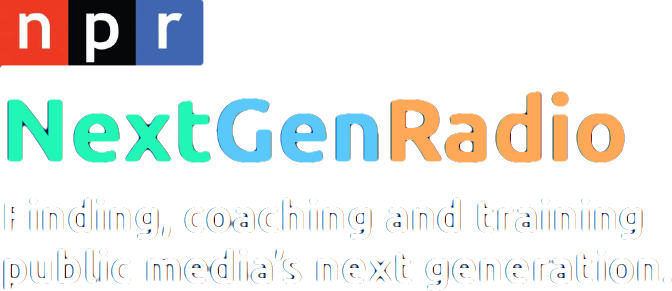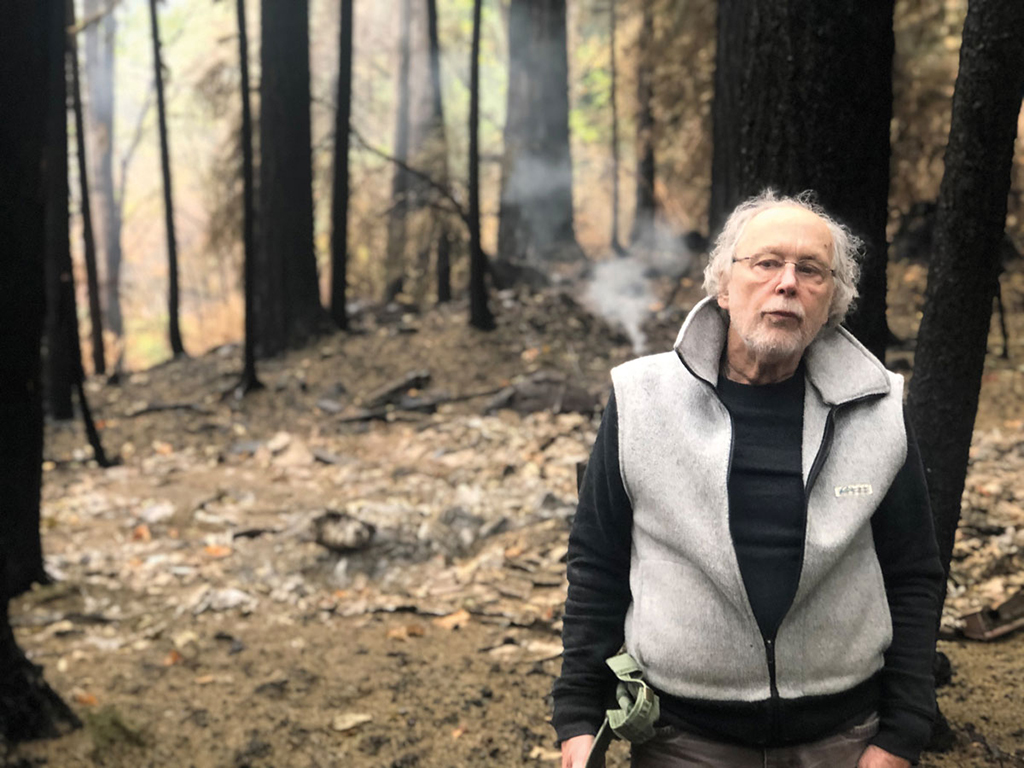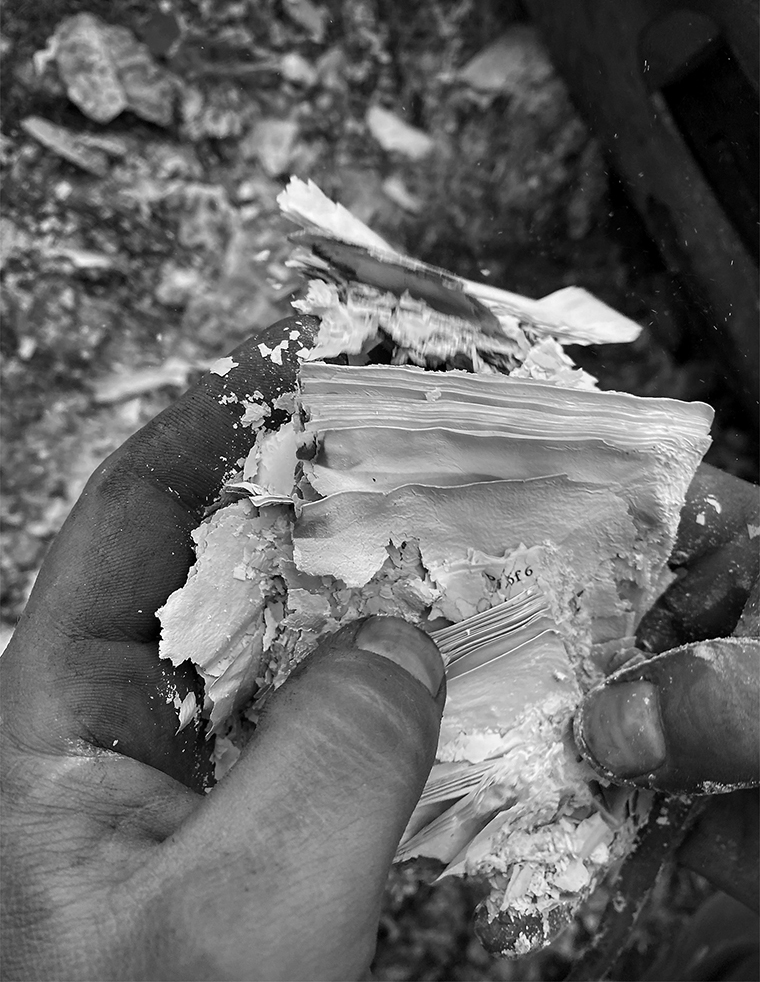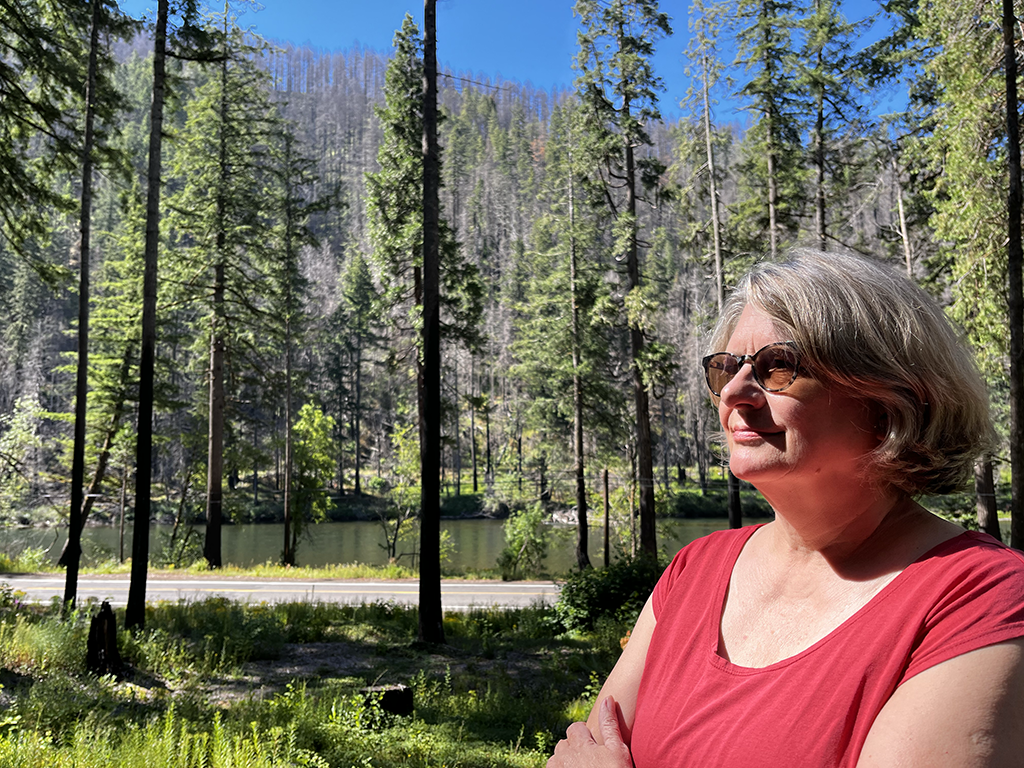
The impact of climate change
We are finding, coaching and training public media’s next generation. This #nprnextgenradio project is created in Oregon, where five talented reporters are participating in a week-long state-of-the-art training program.
In this project we are highlighting the experiences of people whose lives are being affected by climate change.
Alayna Becker speaks with Debra Gwartney, a writer who lost her home to wildfire, and her husband shortly after. This personal and cultural devastation is a look at what’s to come as many more homes are at risk due to climate change. Gwartney is using her loss to sound alarms that communities, forests, and healthy watersheds must be considered in fire recovery.
Illustration by Yuni Dai
Overwhelming Loss: Fires, Grief, and Embracing the Burning World
(Finn Rock, Oregon) On September 8, 2020, smoke began to fill the McKenzie River Valley. Debra Gwartney and Barry Lopez were concerned about the smoke and the wind, but a local emergency management organization texted them that the smoke was from a distant fire and that they were not at risk. But by 11 p.m. Gwartney awoke, choked in a thick haze of smoke, and then, a loud bang on the door from a firefighter, who said they had five minutes to gather what they could and evacuate. Outside, the high ridges of the river valley surrounding their home were engulfed, and glowing orange by the Holiday Farm Fire, which burned 173,000 acres and destroyed almost 450 homes.
Gwartney made her way out of their riverside home and into the blazing night with her husband, who was sick with cancer, leaving all their belongings behind. That would be Gwartney and Lopez’s last night in their home, where they lived, and wrote dozens of books between the two of them.
Overwhelming Loss: Fires, Grief, and Embracing the Burning World

Barry Lopez, pictured here in 2020 immediately following the fire in Finn Rock, Oregon, where he lived and wrote for 50 years. (Photo courtesy of Debra Gwartney)

Barry Lopez grasps pages from his 50-year writing archive, which was lost in the fire. Lopez was an environmental writer….more about this here. (Photo courtesy of Debra Gwartney)
Gwartney was just one of more than 700 families who lost their homes during the state’s 2020 fire season. Aided by climate change and a century of forest mismanagement, the risk to Oregon homes is increasing.
Wildfire is a natural part of the landscape of the west, but longer periods of drought and higher temperatures caused by climate change are sparking more fires. A recent report from the United Nations describes a worsening cycle: higher temperatures and more frequent droughts make it easier for fires to start and spread. In turn, those blazes release more climate-changing carbon into the atmosphere as they burn through forests.
It’s not just climate change. Early fire management was led by the traditional stewards of this slice of western Oregon, the Molalla, and the Kalaypua tribes. For thousands of years, these tribes practiced cultural burning. These smaller fires consumed dead leaves and dropped branches and other benefits like encouraging food supplies to regrow. In 1910, the U.S. Forest Service was formed and focused on absolute suppression, a practice that squashed every small forest fire leaving branches and biomass to pile up, creating fuel in the forest understory, leading to massive fires.
When Gwartney and Lopez were allowed back into the valley, the mossy rainforest where they had made their home, once rich with douglas fir, sword ferns, and huckleberries was scorched earth. Their home had been spared, but was too damaged for them to return.
Then on December 25, just over four months after evacuating from the fire, Lopez died from complications related to his prostate cancer. He was ill before the fire, said Gwartney, but she’s sure the stress of the fire precipitated his death.
“It has undone me to lose my home the way I did,” she said. “To lose Barry so soon after the fire, it’s just, I don’t know what to do with that loss.”
The loss doesn’t end there.
“I’m not sure how it was allowed, but for some reason, private industry could come in here and log after the fire where they couldn’t before,” Gwartney said.
A Bureau of Land Management rule introduced under former President Donald Trump, has made it easier for logging companies to access lands after a forest fire. The rule speeds up the environmental review process leaving little time for community input.
“We got tremendous pressure to [salvage log],” she said.” After Barry died, I was getting eight or ten phone calls a day offering me a lot of money to salvage log.”
Gwartney watched as insurance companies rushed into the valley to make quick deals, which didn’t give some families enough money to rebuild their homes. And lumber companies came in to make deals for logging.
Without trees, little is holding the hillsides together to prevent erosion and protect the river. Major areas of the valley are now considered high risk for post-fire flooding and landslides, according to an analysis from the Federal Emergency Management Agency following the Holiday Farm Fire.

Debra Gwartney stands on the deck of her former home, looking over the McKenzie River. Gwartney says that the devastating loss of trees is due to fire, logging and Oregon Department of Transportation’s clearing of “danger trees.” (Photo by Alayna Becker)
“I thought this was going to be a story of climate change, but it’s actually a story about greed.” Gwartney said.
In 2022, the McKenzie River valley is blooming anew with fuschia fireweed and foxglove. Vine maples unfurl on crisp ridges. Their home has been restored and placed in the care of the McKenzie River Trust, who will use the home as the Barry Lopez Center. A place for community to heal after the fire, and for writers to bring a new world into being.
In his final book Embrace Fearlessly the Burning World, edited by Gwartney and published posthumously in May 2022, Lopez writes, “We must reckon with the sixth extinction, which will remove, for example, many of our pollinators, and one day, probably many of us. We must invent overnight, figuratively speaking, another kind of civilization, one more cognizant of limits, less greedy. More compassionate. Less bigoted. More inclusive. Less exploitative.”
Audio Transcript
Debra Gwartney:
(Sound of the McKenzie River)
This was the safest place we could imagine, and it doesn't feel safe anymore.
We're, we’re standing in my former home that I shared with my husband, Barry Lopez, on the Mackenzie River on the Lee side of the Cascades.
And then on September 8th of 2020, it, it, it all burned in the Holiday Farm Fire.
The winds were coming from the east, which was extremely unusual.
These huge, just the giant 200-foot Douglas Fir trees and Cedar trees and Maple trees. And, and they were just whipping around. And I thought, these cannot… this can't stand… I mean, this, these trees are going to come down on us.
The smoke was unbelievable and I started to get really worried. And I, and then I got an alert on my phone, and the alert said: ‘Stop calling 911. You do not have a fire in your area. This smoke is from a different fire.’
You know, this is weird, but we won't worry.
So I went to bed and I woke up I, I, I woke up about 10:30 or 11, I'm not sure, and I thought, ‘What in the world is going on?’ I mean, I was choked with smoke. I, I couldn't breathe at all. I jumped up and I opened the window and billowing smoke came in.
And I heard this pound, pound, pound, pound on the front door and I opened the door and it was a firefighter and he said, ‘You have 5 minutes to get out of here but you gotta get out.’
So I ran, I, I walked outside and all three of these ridges were on fire. Everything was on fire. I, I, I couldn't even let myself take it in. I just kept asking myself, ‘Why is the sky so orange?’
The trees were crackling. Stuff was falling on fire. It was absolutely insane.
It's you know, it's undone me to lose my home and the way that I did. And. And to lose Barry so soon after the fire, it's just um, I don't know what to do with that, that loss.
Oh I miss him so much. He was, he was quite ill already when the fire happened, but the fire precipitated his death. I'm sure it did.
For some reason private industry could come in here and log after the fire where they couldn't before.
We decided as a couple after the fire that we weren't going to salvage log this land. And we got tremendous pressure to do that. Tremendous. Almost every day. In fact, I, after Barry died, I was getting eight or ten phone calls a day offering me a lot of money to salvage log.
There's a great deal of value in leaving a burned forest standing. The trees will fall the way they need to fall and they'll nourish the land and they'll help the recovery.
But my great fear is that when there's a climate change incident like this, that things are gonna happen so fast to gather up resources that the people – the traumatized people – aren't even gonna be able to notice what's happened.
I got into this terrible habit of counting the logging trucks that were coming down as I was coming up. And at first it was every 15 seconds, and then later it was more like every 30 seconds.
I think the big worry about the clear cutting, uh, is the erosion that will be caused. Um, and already I've been hearing about a land- about a lot of landslides, rockslides. And that's just gonna have to get worse, right? Because there are no trees to hold back the soil.
This is the drinking water for Eugene and Springfield and what are they gonna do about that?
I thought this was gonna be a story of climate change, but it's actually a story about greed.
(Sound of the McKenzie River)